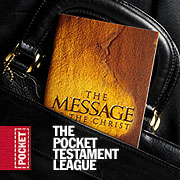For we know in part and we prophesy in part, but when perfection comes, the imperfect disappears.
Thoughts for Today:When someone displays the gift of prophecy, they do not have access to the complete knowledge of God. Prophesy is given in part -- so we get a "word" of knowledge or a "word" of wisdom -- from the Spirit of the Almighty God to help with a present or coming situation. However, there are some people who debate this concept. They believe that "perfection" (verse 10) refers to the Bible. Their position is that upon canonization of the New Testament, there was no longer any need for prophecy. Why? Because everything God wanted us to know was already contained in Scripture.
I don't agree. Although God's Word is perfect (Psalm 19:7), that cannot be the "perfection" spoken of in our passage. The problem with this relatively new interpretation (only in the last 100 years or so) is that it violates what Paul has been saying in the context of his letter to the Corinthian Church. Paul is not talking about the Bible. And he's not speaking in a symbolic sense, but rather, of seeing Jesus -- literally face to face. There is no other way to interpret this section except as a description of when we stand before the Lord after this life. Then we will know all things. When Jesus, the perfect one comes, we will have no need for prophecy, tongues or interpretation. Why? Because He is the Personification of Perfection.
Questions to Ponder:The Holy Spirit is at work in the church and believers today. And in some cases, the result of His work can be gifts of prophecy, speaking in tongues and knowledge. (1 Thessalonians 5:18-20: "In everything give thanks; for this is the will of God in Christ Jesus for you. Do not quench the Spirit. Do not despise prophecies.") Have you been listening to the Spirit? Has a long held prejudice restricted your ability to operate in the gifts of the Spirit or to benefit from them? Perhaps it is time to challenge some of your long held beliefs in the on-going work of the Holy Spirit. What does the Bible say in context?





 RSS Feed
RSS Feed
